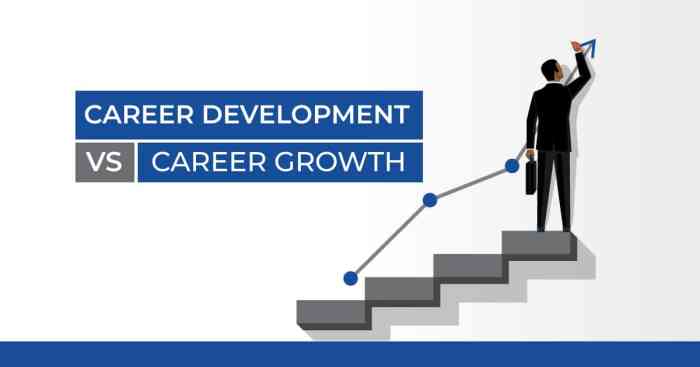Career Growth Strategies takes center stage in this guide, inviting you into a world of knowledge and opportunity. Get ready to elevate your career with these essential strategies.
Overview of Career Growth Strategies
In the ever-evolving world of work, career growth strategies play a crucial role in helping individuals navigate their professional journey. These strategies involve intentional planning and actions taken to advance one’s career and achieve long-term goals.
Importance of Career Growth Strategies
- Enhanced Skill Development: Career growth strategies focus on continuous learning and skill development, allowing individuals to stay competitive in the job market.
- Increased Job Satisfaction: By setting clear goals and working towards them, professionals can experience greater job satisfaction and fulfillment in their careers.
- Better Opportunities: Implementing career growth strategies opens up new opportunities for advancement, whether within the current organization or through external job prospects.
Differences from Traditional Career Paths
- Flexibility: Career growth strategies offer more flexibility compared to traditional linear career paths, allowing individuals to explore different roles and industries.
- Proactive Approach: Unlike traditional career paths that rely on seniority or tenure, career growth strategies involve a proactive approach to career development, empowering individuals to take charge of their professional growth.
- Focus on Personal Development: While traditional career paths may focus solely on climbing the corporate ladder, career growth strategies emphasize personal development and holistic growth beyond job titles.
Setting Clear Goals
Setting clear and achievable career goals is crucial for growth because it provides direction, motivation, and a roadmap for success. Without clear goals, individuals may feel lost or unsure of their next steps, hindering their progress and development.
Importance of Setting Clear and Achievable Career Goals
- Helps to focus and prioritize efforts towards a specific objective.
- Increases motivation and commitment to work towards something meaningful.
- Provides a sense of accomplishment and fulfillment when goals are achieved.
- Guides decision-making processes and helps in overcoming obstacles.
Examples of Short-term and Long-term Career Goals
- Short-term: To complete a certification course within the next six months to enhance skills in a specific area.
- Long-term: To become a senior manager in the company within the next five years by acquiring leadership skills and experience.
Tips on Aligning Personal Goals with Career Growth Strategies
- Reflect on personal values, interests, and strengths to determine what truly matters to you.
- Set SMART goals (Specific, Measurable, Achievable, Relevant, Time-bound) to ensure clarity and focus.
- Regularly review and adjust goals as needed to stay aligned with changing priorities and circumstances.
- Seek feedback from mentors or peers to gain different perspectives and insights on your goals.
Continuous Learning and Skill Development

Continuous learning plays a crucial role in career growth as it helps individuals stay relevant in an ever-changing job market. By acquiring new skills and knowledge, professionals can enhance their capabilities, increase their value to employers, and open up new opportunities for advancement.
Various Ways to Acquire New Skills
- Enrolling in online courses and certifications relevant to your field.
- Attending workshops, seminars, and conferences to learn from industry experts.
- Joining professional networks and associations to stay updated on trends and best practices.
- Participating in mentorship programs to gain insights from experienced professionals.
Examples of Upskilling and Reskilling
- Upskilling: A marketing professional taking a course on digital marketing strategies to enhance their online marketing skills and adapt to the digital landscape.
- Reskilling: An administrative assistant learning coding languages to transition into a career as a web developer due to the increasing demand for tech skills.
Building a Professional Network
Networking plays a crucial role in career growth strategies as it allows individuals to connect with professionals in their field, gain insights, and open up opportunities for advancement. Building a strong professional network can lead to new job opportunities, collaborations, mentorship, and valuable industry knowledge.
Tips to Expand and Maintain a Professional Network
- Attend industry events, conferences, and seminars to meet new contacts and expand your network.
- Utilize social media platforms like LinkedIn to connect with professionals in your field and engage in meaningful conversations.
- Join professional organizations and associations related to your industry to network with like-minded individuals and stay updated on industry trends.
- Offer to help others in your network by sharing knowledge, providing resources, or making introductions, as networking is a two-way street.
- Regularly follow up with your contacts, send personalized messages, and stay in touch to maintain relationships and nurture your network.
Examples of Networking Opening up Opportunities for Career Advancement
Attending a networking event led to a job offer at a prestigious company, as a contact referred me for a position that perfectly matched my skills and experience.
Connecting with a mentor through networking provided valuable guidance and support, helping me navigate challenges and accelerate my career growth.
Seeking Mentorship and Guidance

Seeking mentorship and guidance is crucial for career growth as mentors can provide valuable insights, advice, and support to help navigate the complexities of the professional world.
Benefits of Having Mentors
- Mentors offer valuable advice based on their own experiences and can help navigate challenging situations.
- They provide guidance on setting goals, making important decisions, and developing new skills.
- Mentors can introduce you to valuable contacts and opportunities within your industry.
- They can offer emotional support and encouragement during tough times.
Strategies for Finding Suitable Mentors
- Attend industry events, conferences, and networking sessions to connect with potential mentors.
- Reach out to professionals you admire through LinkedIn or other networking platforms to express your interest in mentorship.
- Join mentorship programs offered by professional organizations or companies in your field.
- Consider former bosses, colleagues, or teachers who have the experience and knowledge to guide you.
Impact of Mentorship on Career Trajectory, Career Growth Strategies
- Having a mentor can accelerate your career growth by providing valuable insights and advice.
- Mentorship can help you set clear goals, develop new skills, and make informed decisions.
- Mentors can introduce you to new opportunities and help expand your professional network.
- Overall, mentorship can have a significant impact on your career trajectory by guiding you towards success.

